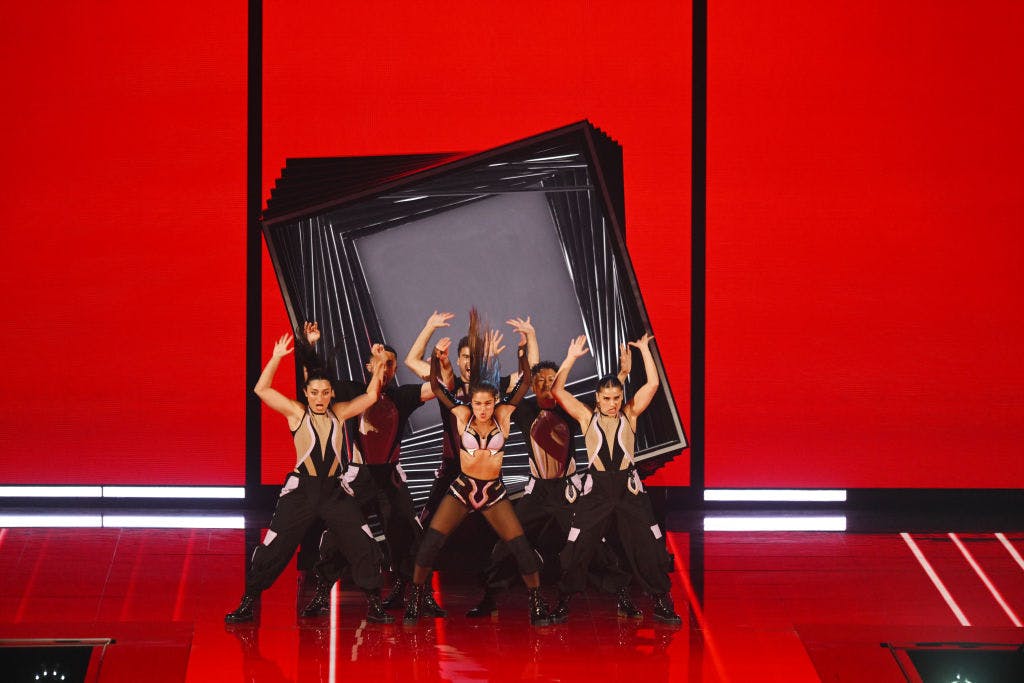Israel Agrees to Demand To Change Lyrics for Eurovision Song Contest, but a Hornet’s Nest Is Stirred
Who cares about a campy song contest? Not many Americans — but enough Israelis do to bend, apparently, to banal European rules.

Pop controversy corked, at least for now: Israel has agreed to change the lyrics of the song with which it intends to compete in the Eurovision song contest.
By doing so, the Israeli Public Broadcasting Company, known in Israel as KAN, said on Sunday it will acquiesce to the demand to erase anything that could be perceived as political — and thus guarantee its participation in the competition.
Israel’s acquiescence to the competition’s dictates may seem like a minor thing, given the scale of the conflict raging in Gaza, but the decision is symptomatic of a bigger question: Is it too soon for Israelis, or anyone for that matter, to respond artistically to the human tragedy that befell the country on October 7?
While Eurovision may be tinnitus for American audiences, the brash annual kitsch fest is for European viewers a night almost as big as the Oscars and a rare event that unifies, if only for an evening, a widely varied quilt of cultures. For Israelis, participating in Eurovision means connecting to the Continent in a way that is, unusually, devoid of politics.
Israel in 1973 became the first non-European country to be allowed to participate in the Eurovision song contest and has won four times, including in 1998 with transgender singer Dana International.
With the contest less than three months away and with Israel at war, politics is difficult to avoid. Several countries have called for Israel to be banned from Eurovision to protest the war in Gaza, which began on October 7 after Hamas attacked the Jewish state and slew at least 1,160 people.
Earlier this year more than a thousand Swedish artists called for a boycott of Israel’s inclusion at Eurovision. Other entertainers, including Helen Mirren, Gene Simmons, and Boy George, said that Israel should be allowed to compete.
After initially threatening to withdraw if its song was not accepted as is, KAN said in a statement that it had finally agreed with the opinion of President Herzog, who suggested making requested adjustments in order to not contravene rules governing political neutrality.
There had been indications that absent compliance with those rules the European Broadcasting Authority might have rejected Israel’s candidate, a 20-year-old Russian-Israeli singer named Eden Golan.
One of the two selected songs, “October Rain,” contained the lyrics, “There’s no air left to breathe / There is no place for me,” and, “They were all good children, each one of them.”
KAN contacted the lyricists and asked them to readapt the texts, “while preserving their artistic freedom.” That freedom of expression has now been compromised — the only thing being debated is to what degree.
In any case, once it receives the modified texts of both songs — the second is called “Dance Forever” — the public broadcasting company will select the one to be sent to the competition organizers “so that they approve Israel’s participation in the competition,” the KAN statement added.
The chosen song will be disclosed March 10, leaving plenty of time for buzz to build ahead of the competition, which will take place in May at the crime-ridden Swedish city of Malmö.
Israel could have avoided the hornet’s nest of European political correctness had it at the outset either opted to skip this year’s Eurovision altogether or come up with songs that dealt with different subjects from the outset.
It did not, and that raises the question of whether it is too soon to examine the horrors of October 7 from anything other than the twin poles of the most elemental human reactions: grief and retaliation.
A slow trickle of artworks and documentaries about the massacres of October 7 — to say nothing of an oversaturated social media landscape — may speak to a genuine desire to come to terms with the scale of the barbarity of the attacks by Hamas.
It could also raise the specter of facile or simply premature commodification of tragedies that are fundamentally personal and/or familial in nature. If Eurovision was the litmus test, it does seem that Israel’s copping to Euro-demands to cave means it has not passed it with flying colors.

